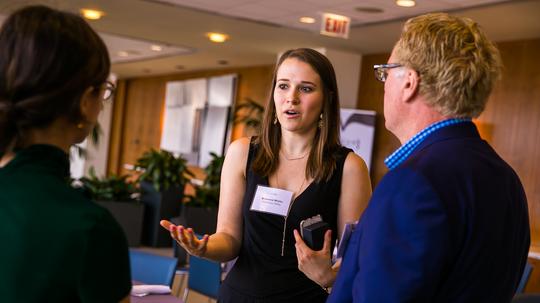
Ritu Trivedi-Purohit, a clinical psychologist who focuses on cancer patients and their families, knew there was a need for her startup Thriveosity when one of her patients had a breakdown over a bonsai tree.
The patient received the tree from a well-meaning neighbor who meant to offer a calming distraction from her diagnosis and treatment. But bonsai trees, which require notoriously meticulous upkeep, was just another thing for the cancer patient to care for beyond managing her disease and taking care of her kids. It was a problem Trivedi-Purohit heard regularly from patients.
"Their healthcare teams didn’t have time or resources to support them [and] the people in their life who wanted to support them, didn’t know what to do or how to do it," she said.
While cancer treatments such as surgery, chemotherapy or radiation target the tumor, another side of the cancer diagnosis also needs to be treated: the patient.
Two startups here in Chicago--Thriveosity and Find Your Ditto--are focused on this side of the diagnosis. These entrepreneurs, based of years of clinical experience and living with chronic illnesses themselves, are using tech-enabled solutions--think subscription boxes and matching algorithms--to help friends and family better support their loved ones fighting cancer, and help survivors connect and support one another.
These founders hope their work can not only improve the quality of life for a patient, but ensure that advances in treatment are as effective as possible for those facing a cancer diagnosis.
Thriveosity: Subscription Boxes That Improve Support
Trivedi-Purohit now aims to make supporting a cancer patient easy, and effective, through her subscription box startup Thriveosity. The startup offers monthly boxes that feature all-natural products that specifically address the side effects and needs of cancer patients going through treatment. These include lotions that treat the rashes that can pop up from radiation, aromatherapy to improve emotional well-being, snacks that provide nutrients to keep patients' bodies strong through treatment, and brain games that provide intellectual stimulation.
Boxes range from $50 to $60 per month and subscribers can choose between one to six month subscriptions. The startup launched last summer and Trivedi-Purohit, who was a member of the latest WiSTEM cohort, said the team is now shipping 50 to 60 boxes each month across the country.
She noted that chemotherapy treatments are increasingly delivered via a pill that patients can take at home. While it decreases the amount of time a patient has to spend in a hospital, it makes medication adherence even more important and more of a challenge: Studies show that adherence rates for oral anticancer therapies range from 16 to 100 percent, as patients on chemotherapy sometimes stop or skip their pills to get ahead of some of the side effects, she said. This can lead to complications, slower recovery and further hospitalizations down the road, increasing healthcare costs for patients and hospitals.
With this in mind, she's also looking into partnerships with pharmaceutical companies and insurers to ship boxes to cancer patients who are using their treatment, and creating more personalization options that speak to a patients' specific condition (a head or neck cancer patient may require different types of food, for example).
"Our approach to medication adherence is really helping the patients do whatever they need to do ease the pain and ease their discomfort, so it is easier for them to stay on their life-saving medication," Trivedi-Purohit said.
"We can’t be so focused on advancement that we lose the race on the care," she added.
Find Your Ditto: Disrupting the Support Group
People live with cancer. They go to work, raise children, run marathons and go on vacation with cancer. But that lifestyle is a lot different for their family, friends, and colleagues who aren't dealing with managing a cancer diagnosis and that can lead to feelings of isolation and worse: Studies show more than 10 percent of cancer patients suffer from depression.
It's the case for many who live with chronic illnesses, like Find Your Ditto founder and CEO Brianna Wolin, who has had diabetes and other autoimmune issues since she was four years old. Her condition requires her to make several life or death decisions every day, and when she got to college at the University of Michigan she spent four years without meeting a single person who shared her daily experience.
"I was diagnosed when I was so little that management was familiar to me, but I wasn’t expecting the feelings of isolation when I hit college," she said.
So Wolin, along with public health researcher Parisa Soraya, cofounded Find Your Ditto as a way for those dealing with chronic conditions, such as cancer, to connect and support those who are living with similar challenges in their area.
Users fill out a profile with their preferences and optional photo, then choose three possible times and dates when they can meet. Find Your Ditto's proprietary matching algorithm matches them with someone in their area who is facing a similar condition and allows users to anonymously message in-app to chat and set up an in-person meeting. Find Your Ditto believes that support could lead to improved health outcomes as well: Studies show that chronic illness patients with sustained support systems better manage their conditions.
Find Your Ditto is currently in pre-launch. But in a low-tech pilot at University of Michigan with approximately 100 students with chronic conditions 60 percent said they felt more supported in their chronic condition after just one meeting, and 98 percent said they would be interested in an additional meeting. Now the startup is in their first pilot and clinical trial with a healthcare system, and eventually plan to charge healthcare systems on a per-patient basis.
We can’t be so focused on advancement that we lose the race on the care
While the platform can be used by people with all types of chronic conditions, Wolin said it has been used by cancer survivors who have helped shape the platform. For example, Find Your Ditto allows users to use an avatar, after cancer patients noted that they could feel self-conscious about how they looked after a treatment. Find Your Ditto is also exploring video meetup options for patients who are undergoing more intensive treatments and may not be able to make it out for a coffee. Jonny Imerman, founder of nonprofit cancer mentorship nonprofit Imerman Angels, has been an ongoing mentor to the team.
"It’s important to recognize that the psychosocial aspects of chronic illness management are crucial, and they can make or break a treatment," she said. "It is something that we can impact. It’s something that, in a very simple way, we are able to...make people feel like they’re not alone."








